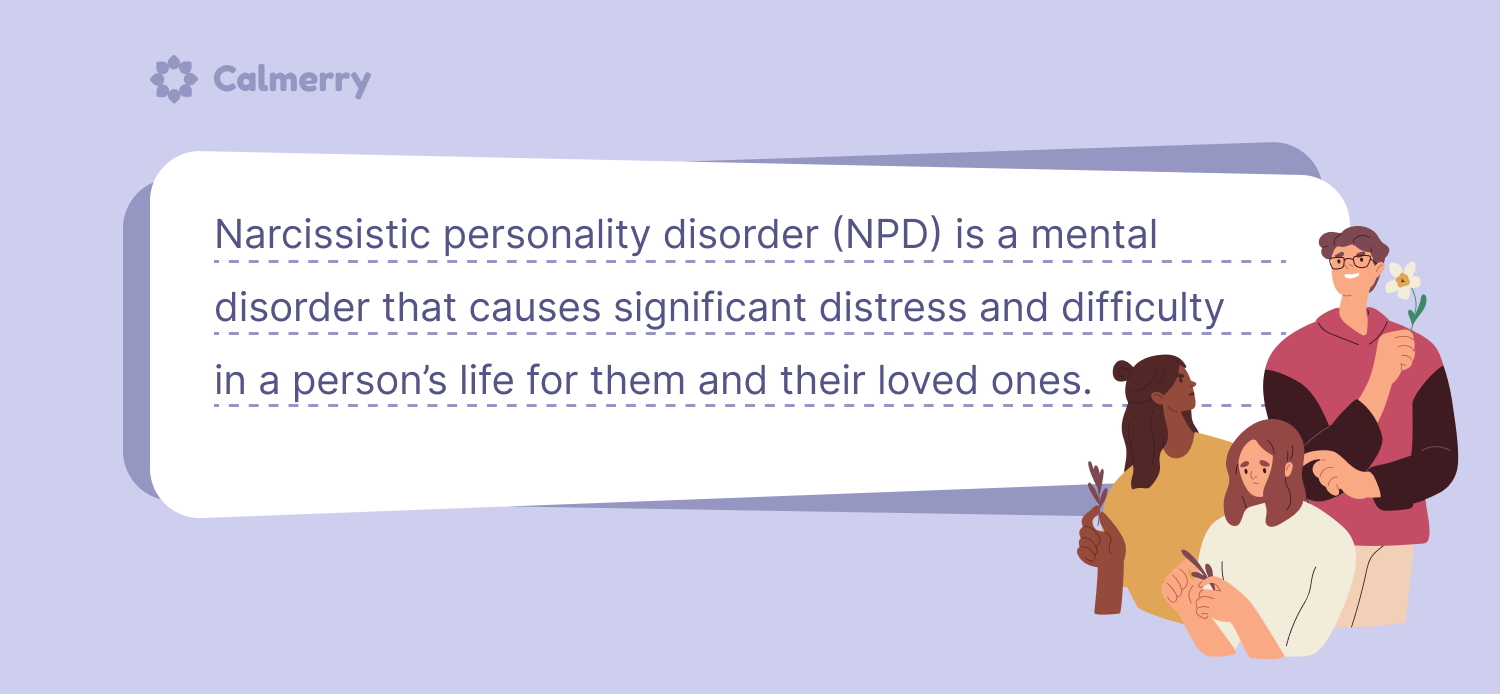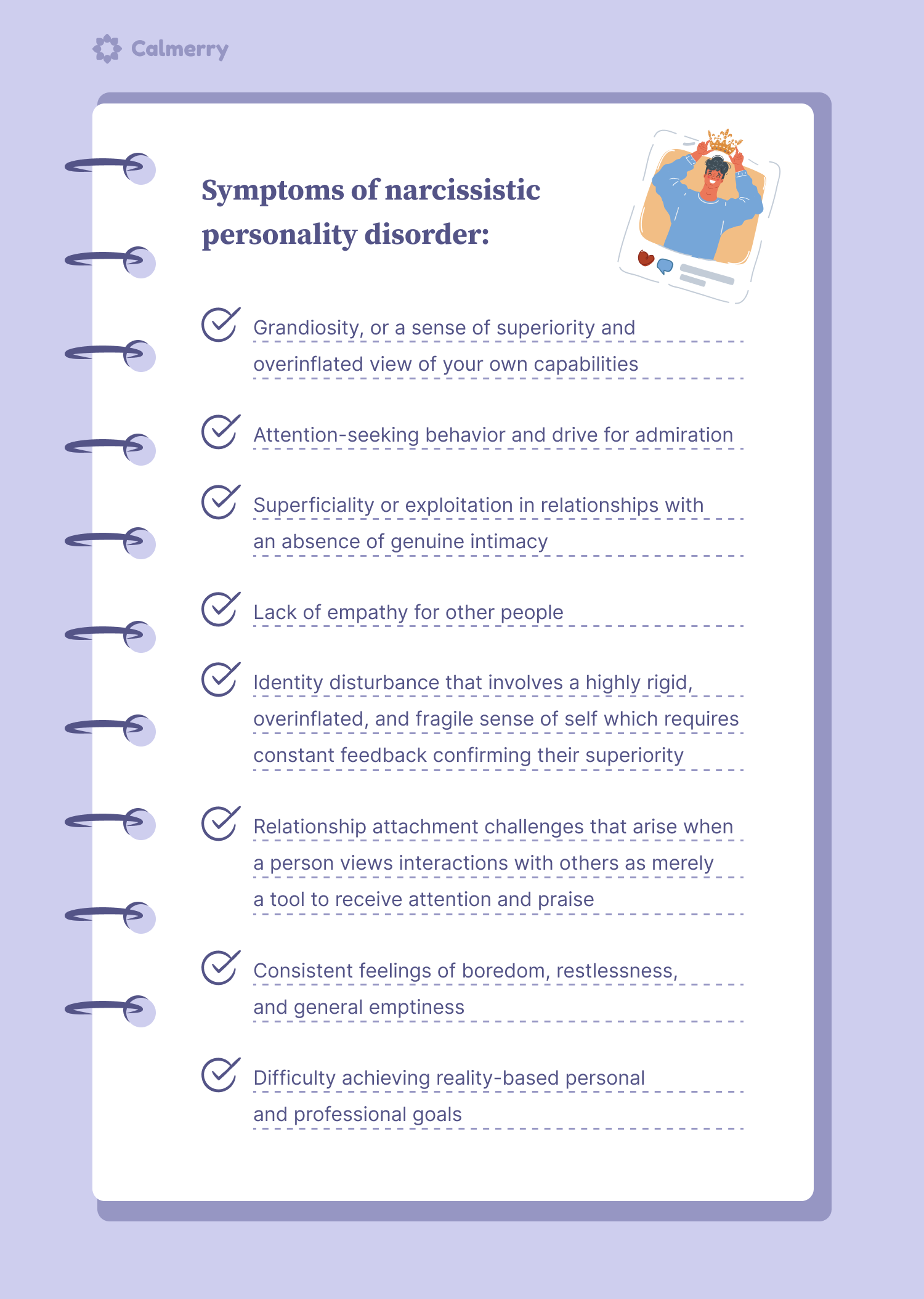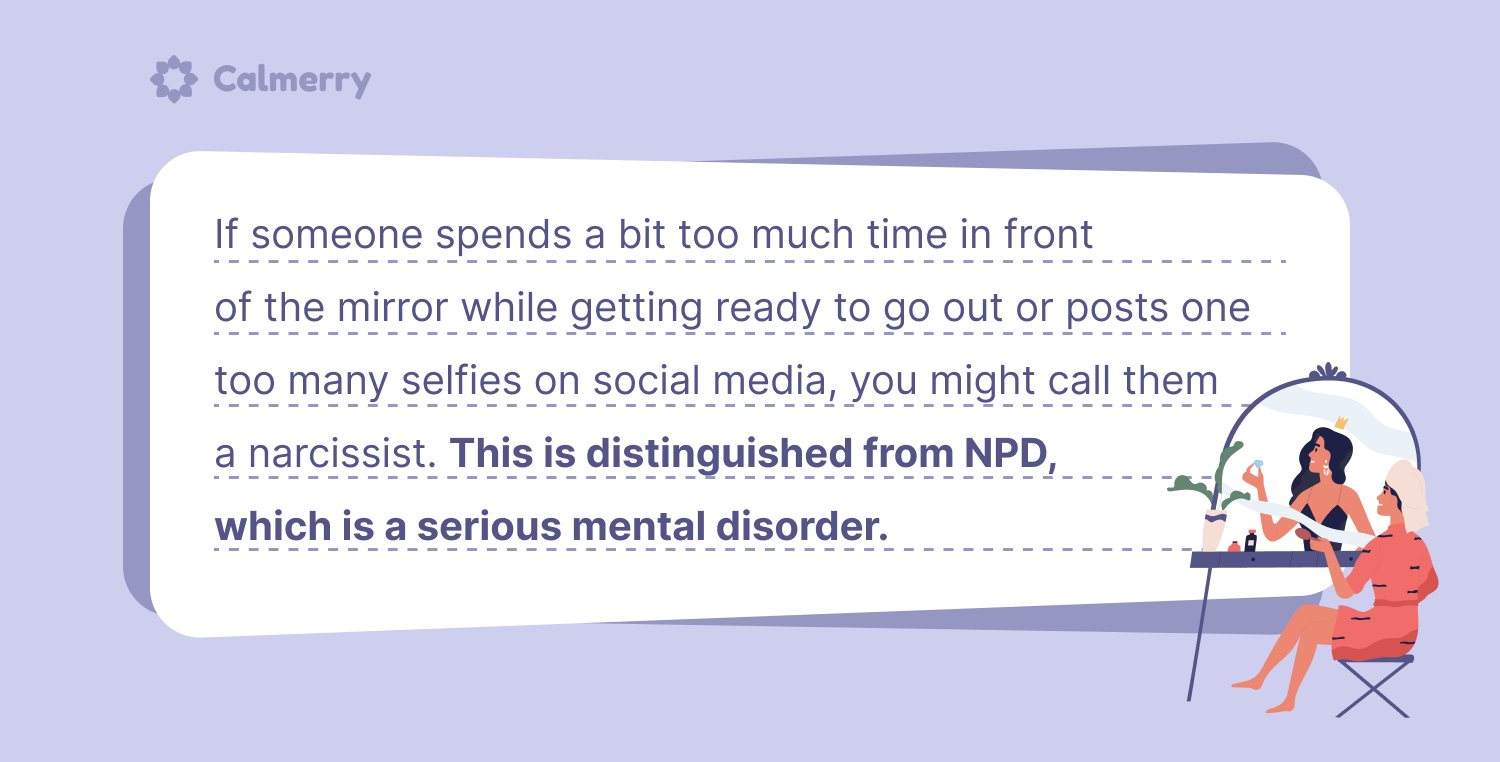What Is Narcissistic Personality Disorder?

In this article
As the myth goes, Narcissus was the beautiful son of a river god and nymph. When he rejected the love of Echo, the gods of vengeance cursed him to fall in love with his own reflection in the waters of a spring, which led to his death.
In psychology, narcissism represents excessive self-involvement, a sense of entitlement, and a need to be admired. Narcissistic personality disorder (NPD) is a mental disorder that causes significant distress and difficulty in a person’s life for them and their loved ones.
There are several types of personality disorders, which occur when someone’s personality traits become so inflexible that it harms their ability to relate to other people.
While self-confidence and self-esteem are natural and positive traits, a person with a narcissistic personality disorder is actually incredibly insecure.

Most studies demonstrate a higher prevalence of NPD among males compared to females. And many people with a narcissistic personality disorder also struggle with additional mental health issues like depression, anxiety, bipolar disorder, substance use disorders, and other personality disorders.
In fact, it is common for people with a narcissistic personality disorder to seek treatment for something else, only then to find out that they also have NPD.
Signs of narcissistic personality disorder to look out for
A narcissistic personality disorder is the most variable of all personality disorders in both symptom expression and severity. It’s, therefore, helpful to think about it in terms of several different subtypes with common core features.
The Diagnostic and Statistical Manual of Mental Disorders (DSM–5) from the American Psychiatric Association lists the symptoms of narcissistic personality disorder to include:
- Grandiosity, or a sense of superiority and overinflated view of your own capabilities
- Attention-seeking behavior and drive for admiration
- Superficiality or exploitation in relationships with an absence of genuine intimacy
- Lack of empathy for other people
Because there are additional features of narcissistic personality disorder that vary significantly from person to person, there is disagreement around the exact criteria needed for the diagnosis.
Models outside the DSM–5 delineate several subtypes of NPD with the core features listed above and also include:
- Identity disturbance that involves a highly rigid, overinflated, and fragile sense of self which requires constant feedback confirming their superiority
- Relationship attachment challenges that arise when a person views interactions with others as merely a tool to receive attention and praise
- Consistent feelings of boredom, restlessness, and general emptiness
- Difficulty achieving reality-based personal and professional goals

Three NPD subtypes
The three subtypes of narcissistic personality disorder include the high-functioning subtype, the grandiose subtype, and the vulnerable subtype.
High-functioning subtype
Someone with the high-functioning subtype of NPD might be relatively stable and successful. It may not even be obvious or apparent that they have a personality disorder at all.
They’ll likely display traits including:
- Competitive
- Exhibitionistic
- Arrogant
- Big ego
- Center-of-attention
And while they may achieve financial or social success, they continue to have an excessive need for admiration and praise, which leaves them feeling empty, bored, and unsatisfied.
Grandiose subtype
The grandiose subtype very much aligns with the description of narcissistic personality disorder in the DSM-5. People with this subtype are overt about their arrogance and sense of entitlement.
They also may be:
- Extroverted
- Attention-seeking
- Superficially charming or flirtatious
- Lacking in close or genuine relationships
- Displaying manipulative behavior
- Bereft of empathy
- Selfish and focused on self-advancement
- Potentially aggressive or intimidating
Vulnerable subtype
Lastly, someone with the vulnerable subtype often appears anxious and distressed, without friends or resources to rely on. This subtype is also called “covert” because the characteristic grandiosity and overinflated ego are covered up by feelings of inadequacy and inferiority.
This person will likely be:
- Constantly comparing themselves to others and resentful towards other people’s successes
- Self-absorbed
- Shy and withdrawn
- Overly sensitive to criticism or feedback
- Secretly entitled
- Fantasizing about their eventual success or conquest
- Contemptuous toward the world
While it’s easy to think of a person displaying these traits as a jerk, NPD can actually be quite distressing and even lead someone to contemplate or commit suicide. The grandiosity and inflated ego characteristic of NPD are typically masking depression and hopelessness.
Narcissism vs. NPD
If someone spends a bit too much time in front of the mirror while getting ready to go out or posts one too many selfies on social media, you might call them a narcissist. This is distinguished from NPD, which is a serious mental disorder.

Why does someone develop narcissistic personality disorder?
It’s not known exactly how or why a person develops NPD. However, it is thought to be a mix of nature (genetic & biological) as well as nurture (life experiences & environment).
Study findings suggest that personality disorders, on the whole, can be passed down through genetics. The study “A twin study of personality disorders” has shown that narcissistic traits can also be inherited. And brain research has begun to locate regions connected to impaired empathy.
Parenting styles and other early experiences have also been thought to contribute to the development of narcissistic personality disorder. The idea behind this is that when young child does not have the opportunity to develop a strong sense of self, they lack puzzle pieces for healthy personality development.
This could stem from parental overinvolvement and overprotection or from neglect, volatility, emotional abuse, or even violence. It is possible to regain these puzzle pieces later in life, particularly with the help of a professional.
What to do if someone you love has NPD
When you met your partner, they may have been the life of the party. Perhaps that’s why you were drawn to them in the first place. But after a while, you probably got fed up with never being able to get a word in edgewise, being demeaned or embarrassed by your partner, and not feeling like you’re truly seen or supported.
If you’re in a relationship with someone with NPD, you’re probably googling things like “How to deal with a narcissist” and “How do you handle a narcissist successfully?”. As much as it impacts the person experiencing the symptoms, personality disorders can be particularly hurtful and damaging to the people on the receiving end.
It’s important to take care of yourself, set boundaries, and create a sphere of support around you. Keep in touch with your friends and family, and continue to pursue your own interests, including your career goals and your personal hobbies.
Engaging in talk therapy, whether through an online therapist and/or a dedicated support group to develop communication strategies and maintain your center when your partner or loved one is acting out or gaslighting you. Keep in mind that you won’t be able to change your partner.
Focusing on what works is healthy for you. And don’t be afraid to leave the relationship if it’s draining your energy, abusive, or harmful to your well-being.
Therapy can help
While NPD has high treatment dropout rates, if you stick with it, talk therapy can help.
Your online therapist can support you in managing your symptoms of narcissistic personality disorder. They’ll work with you to uncover the issues that contribute to your damaging behavior and guide you in learning how that behavior impacts others.
Furthermore, therapists will work with you to develop methods to cope with difficult emotions, support you in creating genuine and healthy relationships, and help you to build an authentic foundation of self-esteem. Calmerry provides a convenient and professional platform for accessing the help you need.
online therapy
live video session



